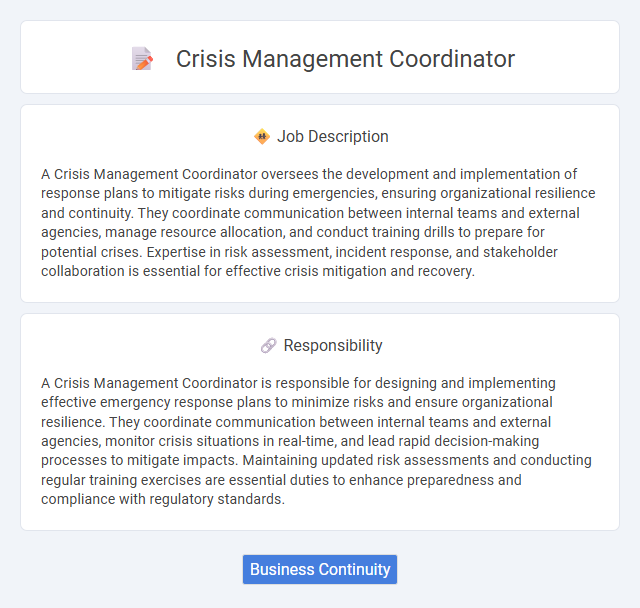
A Crisis Management Coordinator oversees the development and implementation of response plans to mitigate risks during emergencies, ensuring organizational resilience and continuity. They coordinate communication between internal teams and external agencies, manage resource allocation, and conduct training drills to prepare for potential crises. Expertise in risk assessment, incident response, and stakeholder collaboration is essential for effective crisis mitigation and recovery.
Individuals with strong emotional resilience and the ability to stay calm under pressure are likely to be well-suited for a Crisis Management Coordinator role. Those who can quickly assess rapidly changing situations and coordinate responses efficiently may find this position aligns with their skills and temperament. Conversely, candidates struggling with high-stress environments or poor decision-making under pressure might face challenges in fulfilling the job requirements effectively.
Qualification
A Crisis Management Coordinator must possess strong leadership skills and expertise in risk assessment, emergency response planning, and communication strategies. A bachelor's degree in emergency management, public safety, or related fields is typically required, alongside certifications such as Certified Emergency Manager (CEM) or equivalent. Experience in coordinating multi-agency efforts, crisis simulations, and real-time decision-making under pressure is crucial for effective crisis resolution.
Responsibility
A Crisis Management Coordinator is responsible for designing and implementing effective emergency response plans to minimize risks and ensure organizational resilience. They coordinate communication between internal teams and external agencies, monitor crisis situations in real-time, and lead rapid decision-making processes to mitigate impacts. Maintaining updated risk assessments and conducting regular training exercises are essential duties to enhance preparedness and compliance with regulatory standards.
Benefit
The role of a Crisis Management Coordinator likely offers the benefit of enhanced organizational resilience by ensuring rapid and effective response to emergencies. Individuals in this position may experience increased job security due to the critical nature of crisis preparedness in various industries. Career growth opportunities might arise from developing specialized skills in risk assessment, communication, and strategic planning during high-pressure situations.
Challenge
Crisis Management Coordinators likely face significant challenges in rapidly assessing evolving situations and making critical decisions under intense pressure. The probability of encountering unpredictable variables requires them to adapt strategies swiftly while ensuring clear communication among diverse stakeholders. Managing limited resources efficiently during high-stress incidents often tests their organizational skills and resilience.
Career Advancement
A Crisis Management Coordinator develops strategic response plans to mitigate organizational risks during emergencies, enhancing skills in risk assessment and communication under pressure. Expertise in coordinating cross-functional teams and implementing real-time solutions positions professionals for roles such as Director of Risk Management or Emergency Response Manager. Building a robust network and gaining certifications like Certified Emergency Manager (CEM) significantly accelerate career advancement within public safety and corporate security sectors.
Key Terms
Business Continuity
A Crisis Management Coordinator specializes in developing and implementing business continuity plans to ensure organizational resilience during disruptions. They conduct risk assessments, coordinate emergency response procedures, and liaise with cross-functional teams to maintain critical operations under adverse conditions. Expertise in crisis communication, recovery strategies, and compliance with regulatory standards is essential to minimize operational downtime and financial impact.
 kuljobs.com
kuljobs.com